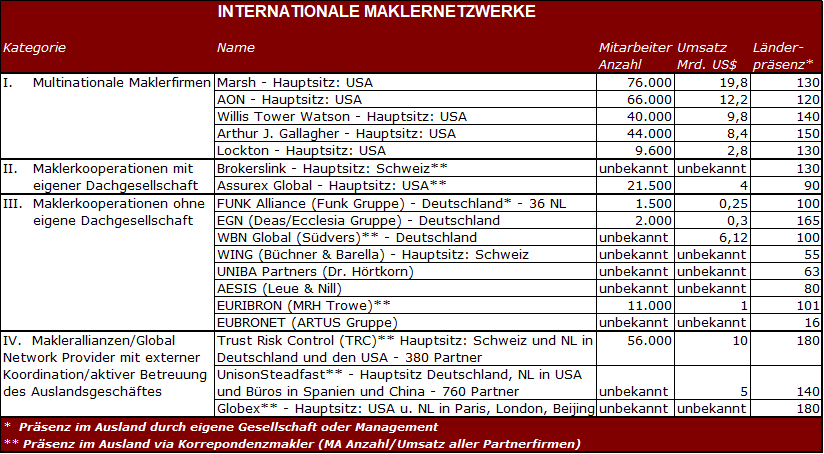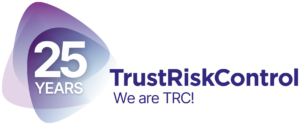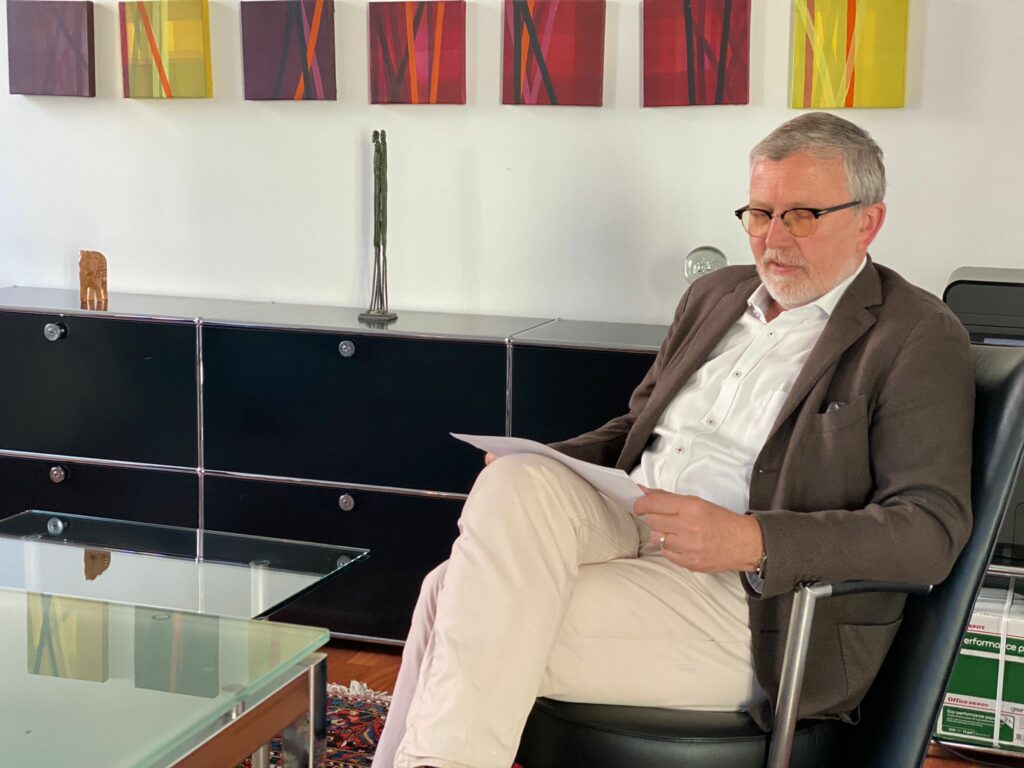Reflecting on 25 Years of Global Insurance Broker Networking
By Christoph Baltsch – Chairman/CEO TRUST RISK CONTROL
It’s 02:50 in the morning when jet lag once again wakes me from my sleep. Where am I right now? USA, Germany, Switzerland or somewhere else entirely? Did I actually miss my flight or was it just the usual nightmare? I roll out of bed and look out the window of the hotel. The streets are deserted and the city lights cast long shadows in the darkness.
When I started 25 years ago to build up an international network for small and medium-sized insurance brokers, the German broker market was also dark at first. Insurance brokers faced increasing competition from predominantly American megabrokers who acquired on the basis of the motto: “Your company operates internationally, and so do we, which is why you’d better sign our broker mandate at the bottom right now. After all, your current broker is not capable of acting globally.” I personally found this very unfair and quickly, the new business idea was born. Why not network these small brokers internationally while providing them with my years of experience in developing and implementing international insurance programs?
In August 1999, I published an article on the strengths and weaknesses of international broker networks, which attracted a lot of attention and caused brokers to rethink their approach. Why hide when you can conquer the world together with a reliable partner? A lot of time has passed since then, which is why a current inventory of international networks and the corresponding services for insurance brokers is more than overdue. Many of the insurance brokers mentioned as examples in the article at the time have since disappeared due to mergers and acquisitions. New networks have emerged, changed names or been taken over by foreign brokers.
It is still quite difficult for corporate and industrial customers or their brokers to decide which international broker network best suits the needs of their own company. Is the size of the broker/network decisive or the number of countries in which a broker is present or has correspondent brokers? Do financial ties between the brokers belonging to the network guarantee quality and reliability? Shouldn’t there be multiple partners per country to hold alternative options in case of a possible sale of the local broker? Is a broker’s ability to obtain digital data on risks, policies and claims abroad a selection criterion?
The structure and mode of operation of international broker networks is still characterized by serious differences, which is why the various categories are first presented in tabular form below for better localization of the individual market participants:

1. Multinational brokerage firms
The order of the TOP 3 brokers worldwide has not changed. Marsh still leads the ranking and the attempt by AON and Willis Tower Watson to take first place in 2021 through a merger ultimately failed due to antitrust authorities in the USA. The competition authorities were not entirely comfortable with the US$30 billion deal. AON then had to pay WTW US$1 billion as compensation for reversing the deal, which had already been agreed between the parties. This example shows that megabroker mergers have now reached their natural limits and that such attempts are unlikely to occupy the media again in the coming years.
Arthur J. Gallagher (AJG), which for many years was described in the USA as the ‘biggest mom-and-pop broker’, appeared on the international scene about 15 years ago. In the meantime, however, it has become a genuine global player through various acquisitions in Asia and Europe. AJG also almost gained a foothold in Germany by buying up certain areas that WTW would have had to divest for antitrust reasons in a merger with AON. After the failed mega-merger of the competitors, AJG had to shelve the corresponding plans for Germany, at least for the time being.
Lockton Global is also represented on all five continents with its own numerous branches, but not yet directly in Germany. Here, the company has been cooperating for decades with FUNK Group, which has forged its own broker alliance (see III.), but at the same time does good business with a large number of US brokers and other internationally active brokers. It is difficult to estimate when Lockton will be able to enter the German market, but the probability increases with the increasing number of private equity-driven broker mergers in Germany and the foreseeable exit strategy of the investors active there (Anacap, GE Capital, etc.) from England and the USA.
2. Broker cooperations with their own umbrella company
A relatively new “star” in the network “sky” is Brokerslink, which bundles the group’s outbound international business via an umbrella company (AG) in Switzerland and 17 shareholders, using this approach to attract multinational companies as customers and successfully defend existing customers against competition from megabrokers. The brand presence is quite impressive and has attracted worldwide attention in recent years thanks to a multi-million marketing budget. Perhaps this is also a reason why the GGW Group recently joined this network after the previous German Brokerslink Partner (Karl Köllner) was sold to AON. In this form of broker cooperation, however, it can be observed that the most important members, intoxicated by their own success in their home country, do not necessarily question the profitability of international expansion plans. Indications of this are the lack of aggregated financial figures from Brokerslink and the fact that the individual members also cooperate with various other networks and brokers at the same time, which, according to their own statements, provide them with significantly more business than their own network. Where this will lead remains to be seen, of course, but industry insiders are already warning that the recent acquisition of brokerslink brokers MDS in Portugal and Leons in Holland by The Ardonagh Group in England could be the start of a creeping takeover of this network by The Ardonagh Group, who, with a richly filled “war chest” of 1.5 billion British pounds, still have plenty of money available for further acquisitions of brokers.
The former market leader and oldest network Assurex Global, on the other hand, has become rather quiet. The umbrella organization in the USA, which was founded in 1954, still has a large number of members there, but has not been very prominent internationally recently. This could be due to the fact that this network was rocked by a scandal a few years ago, which originated from an Asian network coordinator or a complaint roundmail from members of this network. On the other hand, Assurex Global also suffers from its ‘one partner per country’ strategy, which led to instabilities in the network given the sale of many partners abroad and the alternative solutions not immediately available. Assurex Global continues to enjoy a good reputation within the U.S., however, as the 47 members there are very closely networked and benefit from common products and markets.
3. Broker cooperations without their own umbrella company
The Funk Alliance, with 36 of its own locations in Europe and numerous hand-picked partners around the world, offers what is probably currently Germany’s largest independent and family-run industrial broker a solid foundation, which has grown organically over 40 years, for the worldwide support of its customers. Funk’s reputation at home and abroad is impeccable and marked by great respect for the pioneering work of Dr. Leberecht Funk, who began establishing international networking relationships decades ago. I also learned my trade in this company and still benefit from it today.
A relatively young network, having been established only three years ago, is the Ecclesia Global Network (EGN). This primarily serves the customers of the Ecclesia Group’s industrial brokerage arm, such as deas (Deutsche Assekuranzmakler GmbH), and together with GrECo, the largest broker in Austria in which Ecclesia holds a stake, has 20 of its own locations. Through its partner network EGN, Ecclesia is represented in a total of 165 countries, which enables this broker to compete successfully with all other German competitors and to further expand its industrial business on a continuous basis.
WBN Global is certainly one of the most important broker networks in the world and particularly successful in the USA. The 31 members there include well-known insurance companies, such as CNA and Travellers, as well as leading brokers, such as USI, Hub and EPIC. In this respect, the brokers belonging to WBN Global undoubtedly broker a not entirely insignificant volume of business abroad, from which Südvers benefits in Germany as the only partner in industrial business. Despite repeated rumors of a sale, Südvers is determined to maintain its independence and stand on its own in the international arena. The chances of this are not bad if the major producers of US-linked business continue to remain loyal to Südvers.
WING Worldwide Insurance Network has existed for decades, but is less visible on the international market. This may be due to the fact that the brokers affiliated to this network tend to be smaller and also belong to various other networks, but this obviously does not prevent the German partners, Buechner & Barella and Glauerdt/GGW, from following these well-trodden paths with at least some international clients. How persistently these networks, affectionately dubbed “dinner club networks” by some colleagues, hold their own in the competition also surprises me personally time and again, but there must be something about such events.
UNIBA Partners is another traditional broker network represented in Germany by Dr. Hörtkorn. According to its own information, the association of 70 brokers covers 63 countries and thus belongs to the rather smaller networks, which, however, can also meet the essential requirements for medium-sized customers, since investments are mostly made in neighboring countries and less overseas.
AESIS is a network of 86 brokers, often written off but apparently still alive, who are at home on all five continents. The more traditional network is represented in Germany by Leue & Nill, who also represent Assurex Global (see II.). With a coverage of around 80 countries, AESIS is also one of the rather smaller networks, but in Germany it has found a partner in Leue & Nill who understands its business or is very familiar with the special requirements of international customers.
EURIBRON is an alliance of 37 brokerage companies which, according to their own information, together cover 101 countries on 6 continents. The aggregate premium of this broker alliance is not insignificant at US$9 billion. The total number of employees of 11,000 and the total number of customers of 265,000 are equally impressive. Nevertheless, EURIBRON is a rather insignificant player compared to other networks and rarely appears on the international stage. It is therefore somewhat surprising that the MRH Trowe Group, which is based in Germany and has grown strongly in recent years, seems to rely on this solution abroad.
EUBRONET is currently the smallest, classic B2B broker network with only 15 members in Europe and one partner in the USA. Nevertheless, EUBRONET can look back on a 25-year history and is represented in Germany by the ARTUS Group, which has a lot of experience in international business. Ms. Alexandra Ganz-Cosby, the current CEO of ARTUS AG has worked for Allianz as well as Trust Risk Control Inc. worked in the USA for several years before taking over the management of the well-known family business. Therefore, she is well connected worldwide and has many years of experience in managing international insurance programs.
4. Broker alliances/global network providers
This business model is quite different from the aforementioned classic broker networks. In contrast to these, the networking with brokers abroad and the handling of international business is carried out by an independent company which acts as an external foreign department and is responsible for both the selection of the respective partners and the ongoing coordination of all insurance issues arising abroad.
The Trust Risk Control (TRC) group of companies, which I founded in Hamburg in 1998 and which moved its headquarters to Switzerland in 2005, is the clear market leader in this business model, with a total of 380 network partners and 56,000 employees, as well as aggregated sales of all partners of US$ 10 billion. TRC mainly includes larger German brokerage houses (e.g. Martens & Prahl, GGW Group), but also a large number of smaller brokers who attach great importance to reliability and loyalty. TRC distinguishes itself from its competitors on the one hand by its uncompromising quality standards and on the other hand by the careful selection of the brokers affiliated to the network, most of whom are among the leading representatives of their industry in the respective countries.
Unisonsteadfast emerged from the brokerage firm Unisonbrokers, which was founded in Hamburg in 2005 and a majority of which was acquired by the Australian Steadfast Group a few years ago. The most remarkable thing about this provider of international services is still the name “Unison”, which still evokes memories of the former broker network of the same name among experienced professionals, which originally included such renowned brokerage firms as Jauch & Hübener in Germany, Johnson & Higgins in the USA and also Gras Savoye in France. It is a pity that only the name remains of this old splendor, because being the supposedly largest broker network in terms of numbers (760 partners worldwide) does not guarantee quality.
Globex International was founded in the USA in 1993, making it the oldest representative of this network category. It is not known which brokers belong to this network and with whom they cooperate in the respective foreign countries. There is only the information that, in addition to the headquarters in New Jersey/USA, the company has 8 regional offices in Beijing, Europe, South Korea, Colombia, Argentina, the Philippines, the Democratic Republic of the Congo and Turkey and is represented in 180 countries. The educated reader of this article is welcome to judge for himself how this fits together.
I hope that the above brief descriptions of the market participants in the network business known to me will help to make the selection of suitable partners somewhat easier. With my own company, Trust Risk Control, I by no means claim to be infallible or even the best. Let each broker decide that for himself. But what has always motivated me and driven me to top performance in my 25 years as a service provider to brokers is the fact that not only is the right selection of a service partner a guarantee of quality, but also the selection of staff familiar with the complex technicalities is an indispensable element in the successful management of international programs. These people are not always visible and often act behind the scenes, but this in no way diminishes their performance. It is not those who bask in the glow of their own greatness or importance, but rather the countless individuals in the shadows who make up the success of international brokerage.


